Public Health Official: Number of Infections on Rise but Situation Still Good
ZAGREB, 7 Aug, 2021 - Croatian Public Health Institute (HZJZ) Assistant Director Marija Bubaš has said that the epidemiological situation in Croatia is good but that caution is necessary as the number of new infections has been on the rise.
"Everyone adhering to epidemiological restrictions is contributing to keeping the situation under control, and we cannot relax entirely. Quite the contrary, we must comply with restrictions and get vaccinated as it takes more than one week to start developing immunity in a satisfactory way," Bubaš told Hina on Saturday.
She noted that now was the right time to protect public health, the situation in the tourism sector and the economy.
This particularly refers to the coastline considering that coastal counties have lower vaccination rates, with Dubrovnik-Neretva and Split-Dalmatia counties being the most exposed, with a large number of tourists staying there. In some destinations, the number of visitors exceeds the number of local residents by five times.
"We cannot be certain that tourists who have entered Croatia with a negative test were not in a period of incubation when they got tested. Such people can develop the disease in Croatia and spread it further. We need to comply with epidemiological restrictions because the situation may escalate. We have to be aware that regardless of the measures taken, we are part of a larger environment where the infection is still spreading," Bubaš said.
For more on COVID-19, follow TCN's dedicated page.
For more about Croatia, CLICK HERE.
Croatia Registers 233 New Coronavirus Cases, One Death
ZAGREB, 7 Aug, 2021 - In the past 24 hours, 233 coronavirus cases and one COVID-19 death have been registered in Croatia, the national crisis management team said on Saturday.
There are 1,201 active cases and 166 hospitalised patients, including 18 on ventilators, while 4,130 persons are self-isolating.
To date, 2,345,366 persons have been tested for the virus, including 7,832 in the past 24 hours.
Croatia has registered 364,832 coronavirus cases to date, including 8,271 deaths and 355,360 recovered patients, 170 of whom have recovered in the past 24 hours.
Croatia has vaccinated 40.9% of its total population, including 49.2% of adults, 44.89% of whom have completed vaccination.
For COVID-19 updates, follow TCN's dedicated page.
For more about Croatia, CLICK HERE.
Croatia to Toughen COVID Restrictions Along Adriatic Coast as of Monday
ZAGREB, 23 July 2021 - Croatia is introducing tougher COVID-19 restrictions in five coastal counties as of Monday, the head of the national coronavirus response team, Interior Minister Davor Božinović, announced at a press conference on Friday.
Any gatherings in one place of more than 50 people without a COVID vaccination certificate will be banned, while the maximum number of people with COVID certificates in one place will be 1,000, Božinović said.
"The entire Croatian Adriatic is currently dancing between the orange and red zones on the EDCD map. These measures are aimed at preventing the introduction of restrictions for travellers returning from Croatia, and this is also their wish," he said, adding that the new measures would be in place until 15 August.
Special restrictions have been introduced for wedding celebrations. If they involve up to 15 persons, they do not need to have a COVID certificate, while for those with more than 15 persons all participants will be required to have such certificates.
Fairs and other outdoor business events can be held only with the approval of local and regional coronavirus response teams. Organisers are required to seek permission for such events no later than seven days before the gathering or event takes place.
The national coronavirus response team has also changed the criteria for entering Croatia, extending the validity of COVID vaccination and recovery certificates. Under the new rules, people can enter the country if their certificates showing that they have been fully vaccinated or have recovered from the disease are not older than 270 days. Previously, such certificates should not have been older than 210 days.
Travellers from Category 1 countries must have a negative PCR test not older than 48 hours and must self-isolate on entering the country, while visitors from Category 2 countries must show a negative PCR test not older than 72 hours or a negative antigen test not older than 48 hours, regardless of the vaccination or recovery status. The Category 2 countries include the United Kingdom, the Russian Federation and Cyprus.
Learn more about travelling to Croatia during the COVID-19 pandemic on our TC page.
Croatia’s Coronavirus Update: 58 New Cases, No Death, 592 Active Cases, 71 Recoveries
ZAGREB, 11 July, 2021 - In the last 24 hours, of 3,453 tests conducted or coronavirus, 58, that is 1.7%, have returned positive, Croatia's national COVID-19 crisis management team reported on Sunday.
Currently, there are 592 active cases, including 106 hospitalied patients, and of them eight are palced on ventilators.
In there last 24 hours no COVID-related fatality has been registered.
A total of 3,626 people are self-isolating.
Since 25 February 2020, when Croatia registered its first case of the infection, there have been a total of 360,826 registered cases, 8,227 people have died as a consequence and 352,007 have recovered, including 71 in the last 24 hours. As many as 2.191,742 coronavirus tests have been performed.
As at 10 July, 2,814,234 doses of vaccines have been administered, with 1,550,632 people having received at least one dose and 1,263,602 of them having received both doses.
For more on COVID-19 in Croatia, follow TCN's dedicated page.
For more about Croatia, CLICK HERE.
Serbian Citizens Can Enter Croatia Without Certificates, Tests and Quarantine
ZAGREB, 27 June, 2021 - Citizens of Serbia can enter Croatia without any restrictions and under the same conditions that were in force before the measures put in place to contain the spread of the coronavirus epidemic, the Serbian Embassy in Zagreb says on its website.
Citing the revised conditions for entry into Croatia of 25 June 2021, the Serbian Embassy says that Serbian nationals do not need a vaccination certificate or a negative PCR test.
On 12 May, Serbia made it possible for its citizens to obtain a digital green certificate proving that they have been vaccinated against COVID-19 and providing the results of PCR, antigen or serological testing. The certificate is recognised by Turkey, Greece, Slovenia and Hungary.
On 19 June, for the first time in eight and a half months, Serbia registered a two-digit number of daily coronavirus cases, and the numbers of COVID-related deaths and hospitalisations have been decreasing steadily.
In the last 24 hours, Serbia registered 63 new coronavirus cases after 4,903 tests done and two deaths. 314 infected persons were receiving hospital treatment on Sunday, including 12 who were placed on ventilators. Since the start of the epidemic in March last year, 716,301 people have been registered as having contracted the virus and 7,031 patients have died, according to the country's health authorities.
Since the start of the vaccination campaign in December last year, 5.2 million vaccine doses have been administered, with 2.7 million people receiving one dose and 2.5 million receiving both doses.
Serbia administers four vaccines - Pfizer/BioNTech, AstraZeneca, Chinese-made Sinopharm and Russian Sputnik V. The Belgrade-based Torlak Institute of Immunology and Virology started manufacturing Sputnik V on 4 June.
For more on COVID-19 in Croatia, follow TCN's dedicated page.
For more on Travel in Croatia, CLICK HERE.
CLICK HERE for more news about Croatia.
Children up to Age 12 to Enter Croatia Without Negative Test - Jutarnji List
ZAGREB, 21 May 2021 - Children up to the age of 12 will be able to travel to Croatia without a negative test to coronavirus, which is now required for children over the age of seven, Jutarnji List daily said on Friday.
The decision of the national COVID-19 crisis management team to allow as of April all vaccinated persons to cross the border without quarantine or testing was very important for domestic tourism, but as the season approaches, the sector is aware that there are still many obstacles to achieving significant tourist turnover.
The most significant obstacle refers to children aged 7-16 entering the country. They cannot be vaccinated because the vaccines have so far been registered for persons over the age of 16, and yet they are not in the group of people who would be exempted from quarantine or getting a PCR test.
According to domestic regulations, all children up to the age of seven are exempted from the obligation to present a test, a certificate of recovery from COVID-19 or a certificate of vaccination when crossing the border, which will make it much more difficult or expensive for all foreign tourists with older children to come to Croatia in the summer.
Several domestic tourist associations have sent an initiative to the Croatian Public Health Institute (HZJZ) about ten days ago to exempt all children under the age of 12 from the obligation to get tested when crossing the border to make it easier for tourists to enter the country this season.
Last year, according to data from the Croatian National Tourist Board (HTZ), children aged 7-16 generated 890,000 arrivals and slightly over seven million overnight stays, which is 16% of the 43,000,000 overnight stays generated by foreign tourists last year.
Children aged 7-16 account for a sixth of the overnight stays generated by foreign tourists in Croatia, and taking into account that those children have two parents accompanying them, the implications for domestic tourism, if the conditions do not change, could be drastic, Jutarnji List said.
For all you need to know about coronavirus specific to Croatia, including travel, border, and quarantine rules, as well as the locations of vaccination points and testing centers up and down the country, make sure to bookmark our dedicated COVID-19 section and choose your preferred language.
Ministry: Number of Arrivals on Election Day Similar to Two Previous Sundays
ZAGREB, 16 May 2021 - On election day, between midnight and noon, 892 Croatian nationals entered Croatia on the grounds of compelling personal reasons, which is similar to the average number of entries last Sunday and two weeks ago, the Ministry of the Interior said on Sunday.
On 2 May, 724 Croatians entered the country and on 9 May 683 did so.
The ministry said that delays on some border crossings on the border with Bosnia and Herzegovina and Serbia were due to passengers returning after a long weekend in some EU member-countries, and passenger traffic was also more intense on border crossings between Croatia and Slovenia.
With regard to inquiries about the arrival of Croatian nationals with the right to vote in local elections, regardless of the country they come from, the ministry recalls that the decision currently in force that bans or restricts border crossing defines exceptions in cases of compelling personal reasons, the right to vote being one of them.
It notes that persons travelling for compelling persons reasons must not stay in Croatia for more than 12 hours and that if they do not leave within that period, they are subject to epidemiological restrictions defined by the decision in force.
The ministry recalls that during their stay in Croatia all passengers, regardless of their category or the country they come from, are obliged to comply with general and special recommendations and instructions by the Croatian Public Health Institute.
For more news about COVID-19 in Croatia, follow TCN's dedicated page.
For more news about Croatia, CLICK HERE.
Veljko Ostojic: If COVID Passport Is Precondition for Traveling, It Is Discrimination
March 4, 2021 – Veljko Ostojic, director of the Croatian Tourism Association, was a guest on the Dobro Jutro, Hrvatska show, where he discussed COVID passports and vaccinations of tourist workers.
"First, we need to define what a COVID passport is. In my opinion, if it is a precondition for crossing the border, then it is discrimination. If it is a document that will allow those who have been vaccinated to cross the border faster and easier – I'm for it," Ostojic told HRT's Dobro Jutro, Hrvatska show.
Although it is not yet fully defined, the COVID passport should be given to those who have been vaccinated, those who have recovered, and those tested by PCR just before the trip, said Ostojic.
Asked whether entering Croatia will be similar to last year's, given that the vaccination will not be as expected, Ostojic said he hoped so. However, the priority goal for Croatia should be to "get green" as soon as possible. In that way, we could say that we are managing the epidemiological situation and that we are a safe country.
"Common European criteria for crossing the border should be defined, the epidemiological situation in our most important emitting markets should be monitored, from Germany, Austria onwards," says the Croatian Tourism Association director. He adds that it is still too early to talk about this topic because we still have a month, a month and a half.
Regarding the vaccination of tourist workers as a condition for the safe destination status, about which a promotional campaign was also launched, Veljko Ostojic says that tourist workers' vaccination will never be 100 percent. The Croatian Tourism Association conducted a survey with the Association of Hoteliers and the Croatian Camping Association. About 70 percent of employees expressed interest in vaccinations a month ago, Ostojic said.
There will likely be an organized vaccination of tourism workers after the first and second priority groups are vaccinated. We hope that it will be during April so that we can readily and vaccinated enter the primary tourist season, concluded Ostojić.
For the latest travel info, bookmark our main travel info article, which is updated daily.
Read the Croatian Travel Update in your language - now available in 24 languages.
Split-Barcelona-Split COVID-19 Trip Report, February 11 to 16, 2021
February 17, 2021 - It's been 3 and a half months since I last braved pandemic travel from Croatia to Spain. So, what's changed? My Split-Barcelona-Split COVID-19 trip report, from February 11 to 16, 2021.
At the end of October 2020, I traveled for the first time since the COVID-19 pandemic ravaged Europe. At the time, European countries were still figuring out how to introduce negative PCR tests for entry and defining what entailed being 'high-risk.' This time around, a year deep into the pandemic, it's safe to say most countries have defined requirements that work for them. Furthermore, the information is readily available for travelers online to avoid any mishaps on their journey, which I nearly avoided (more on that later).
Not quite for tourism purposes, I booked my trip to Barcelona to visit my partner who currently plays water polo there. His birthday falls on February 13, conveniently before Valentine's Day, and fortunately, on a weekend when he didn't have any games. Much like my first trip visiting him there, I needed to bring a suitcase of his belongings, which had been sitting in my bedroom since COVID-19 forced him out of Split last March.
Unfortunately, it wasn't much easier getting to Barcelona this time - and thanks to the double whammy of it being the offseason in the middle of a pandemic, not only were ticket prices steep, but the usual two-hour travel time turned into 14-hour travel days from start to finish.
The only available options were on the route from Split-Zagreb-Frankfurt-Barcelona and back, operated by Croatia Airlines and Lufthansa. At least my luggage was included in the ticket price.
I was tested for COVID-19 24-hours before my departure at the Vukovarska testing center in Split. A huge win is that testing prices were halved at the end of January, so instead of paying almost 900 kn for a PCR test and English translation, tests are currently 400 kn and 450 kn with a translation. I was tested at 7:40 am and received my result via email before 5 pm the same day, in English, and with my passport number included (another requirement for Spain).
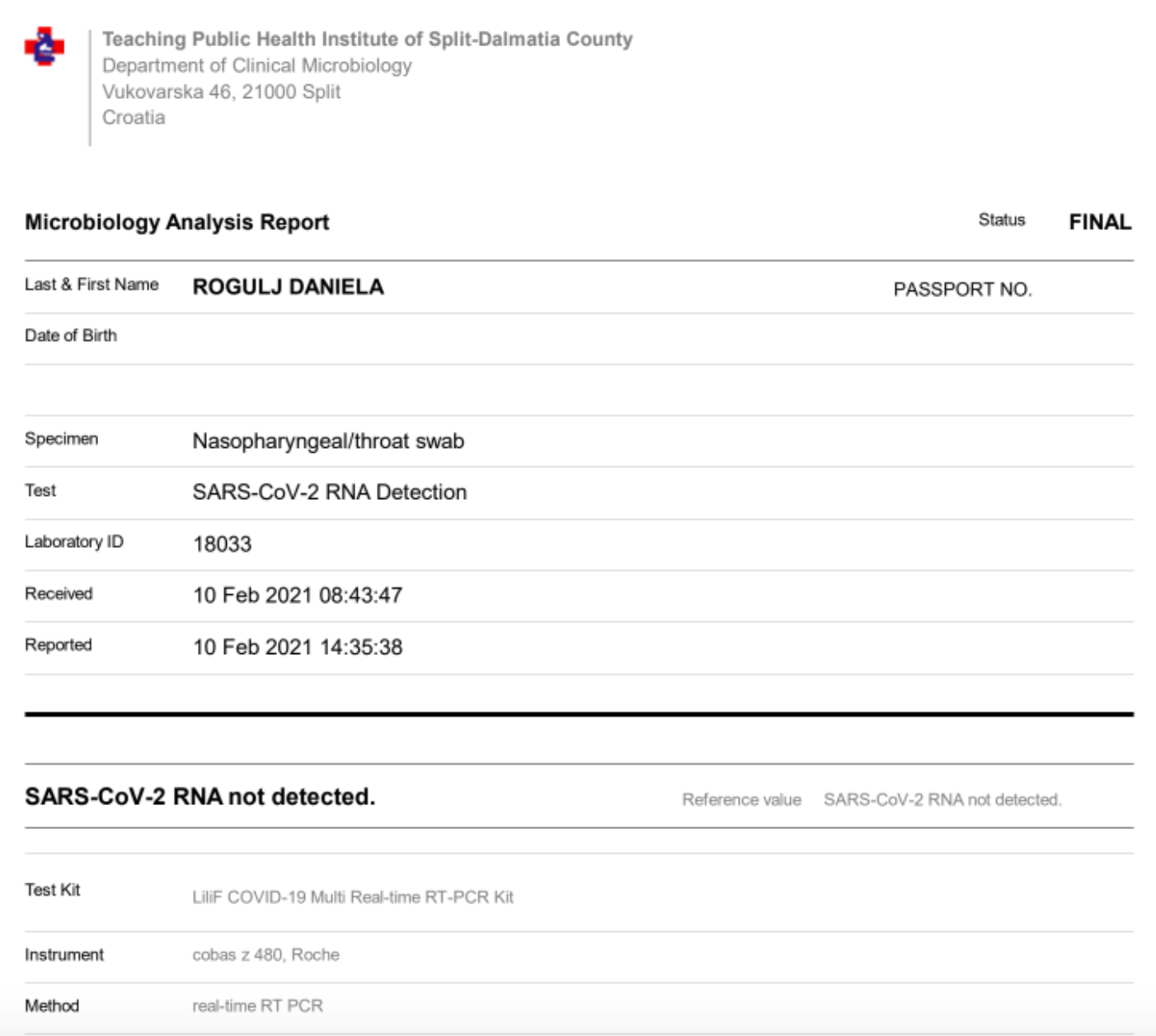
My 6:50 am flight time to Zagreb had me awake at 4 am to make sure I had everything in order. Arriving at the airport with just over an hour to spare, the woman at the check-in counter ensured I had a negative COVID-19 test in hand and confirmed that I had completed the health registration form for Spain as I'd need the QR code to enter the country. I did.
"You're my favorite kind of traveler."
As you can imagine, Split Aiport doesn't have much going on before 6 am, especially during corona times, so I was through security and at my gate with plenty of time to spare. My flight to Zagreb was nearly full.
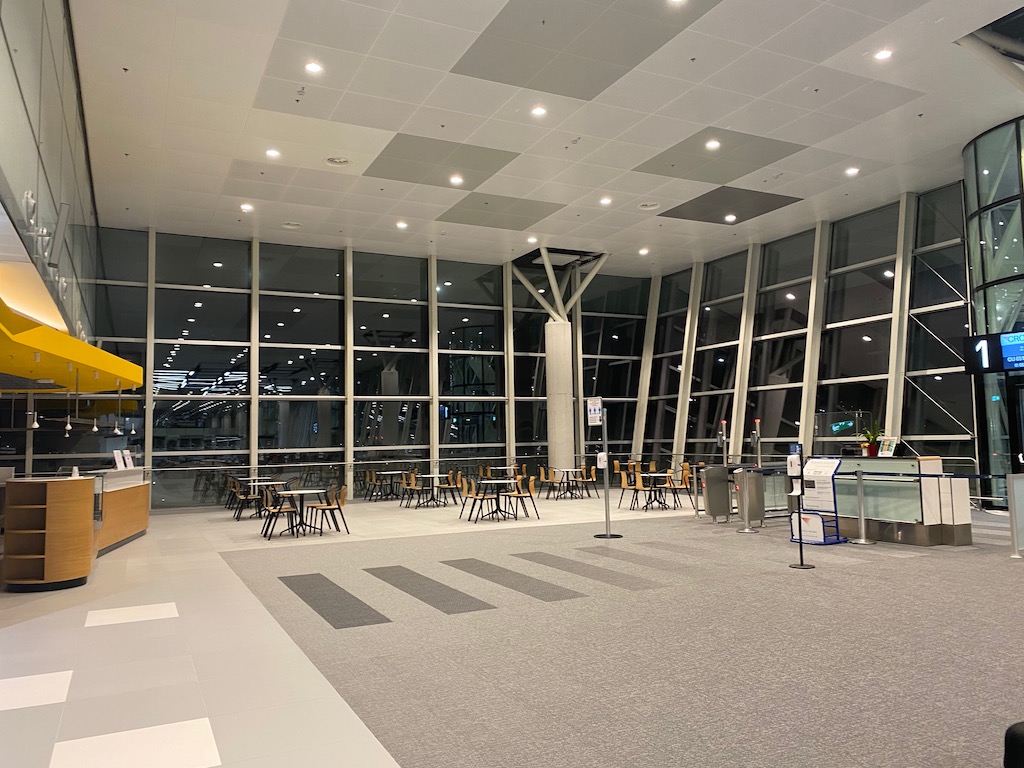
My quick connection in Zagreb had me there long enough to examine that Costa coffee was open for to-go drinks and pastries, and Duty-Free welcomed a few shoppers. Other than that, there is not much to do but stare and each other's masks while waiting to board.
Observation: Unlike when I traveled in October, the airport staff was not concerned with the type of mask passengers wore. Last time, we were only allowed disposable surgical masks, which were checked and distributed if needed before boarding. This time, cloth, filter, and disposable masks were accepted.
Croatia Airlines shared disinfectant wipes to all passengers once they boarded the flight.
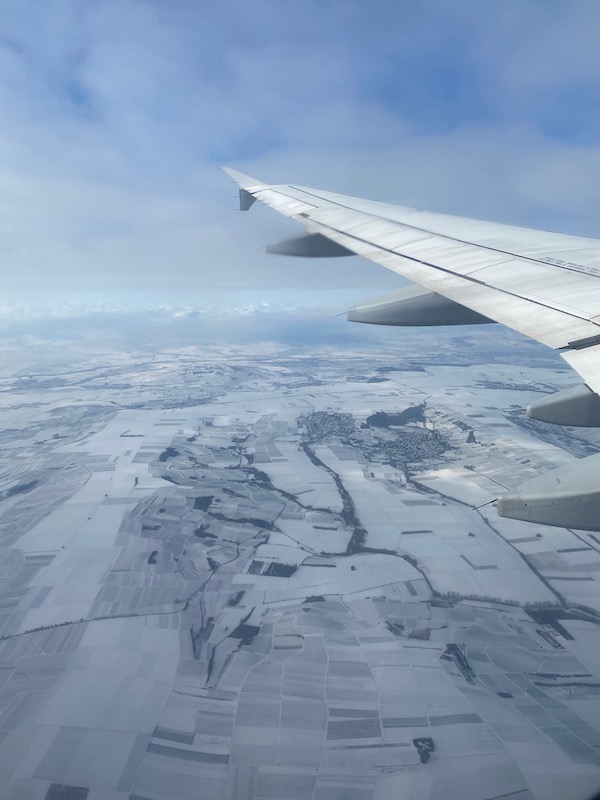
My arrival in Frankfurt was smooth, and a quick trip through security brought me to my gate two hours before my departure to Spain. Frankfurt airport was busy with travelers, but only cafes, hot dog stands, and small convenience shops worked.
All that was needed when boarding for Spain was my ticket and passport - no QR code or test result was checked then, though they did announce on the intercom before boarding that both documents were required. My flight was full.
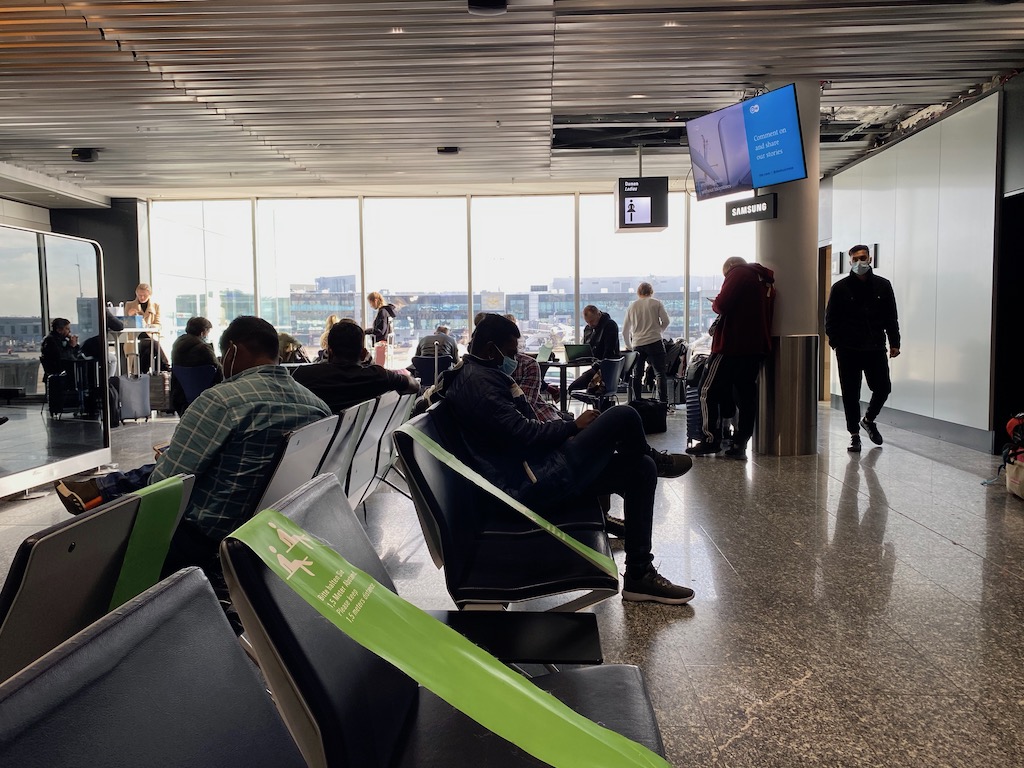
Spain changed their entry requirements in November 2020, two weeks after I visited last time.
"Spanish authorities require all passengers traveling to Spain to complete the FCS health control form (exceptions are passengers in transit). The generated QR code must be presented upon arrival. All travelers to Spain over 6 years of age must have a medical certificate with a negative COVID-19 RT-PCR or TMA test result. The test must have been taken at most 72 hours before arrival, and the certificate must be in English, German, French, or Spanish. Spanish authorities may impose fines up to EUR 6000 per person to passengers who do not comply with entry regulations," Lufthansa alerted me before my flight.
We arrived in Spain and headed to baggage claim, though not before we entered an area marked for health checks, with airport officials showing passengers to one of two lines. I was ushered into the line where my entry QR code was scanned (and no COVID-19 test checked), while the other line had various health officials checking test results and QR codes. I arrived at baggage claim 30 seconds later and received an email from Spanish health officials welcoming me to Spain.
Another thing that was different in Spain this time is that restaurants and bars are open for indoor and outdoor dining, albeit during two-time blocks - in the morning for breakfast from 7:30 am to 10:30 am and for lunch from 1 pm to 4:30 pm. While there is still a curfew between 10 pm and 6 am, delivery works until 11 pm. Barcelona closed indoor and outdoor dining a week before I arrived in October.

This was a game-changer, given that bars and restaurants have been closed for indoor and outdoor dining in Croatia since November.
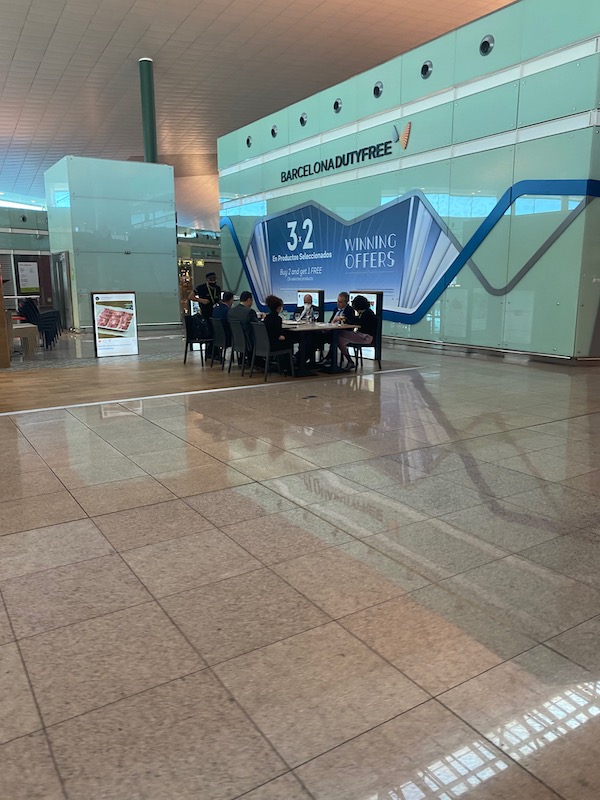
Like my last trip to Barcelona, masks are mandatory inside and outside, and it's rare to find anyone not following the rules. Shoppers sanitize their hands upon entering any store, and the discipline of the citizens does not go unnoticed.
Twenty-four hours before my flight back to Croatia, I took a PCR test at a local clinic that promised same-day results. The price was not as friendly as in Croatia (85 euro), but I wanted to ensure I was healthy returning home, especially since I would be in contact with my high-risk mother who babysat my cats while I was away.
Recall, if you do not show a negative PCR test, no older than 48 hours, upon arrival in Croatia, you are subject to self-isolation until you can show a negative PCR test, which is done at your expense. More on that here.
The testing experience in Spain was also a bit... aggressive. The nurse swabbed deep into each nostril for 10 seconds and continued to all corners of my mouth and gums, unlike the far more delicate experiences I've had in Croatia. I received my negative test result the same day, around 6 pm.
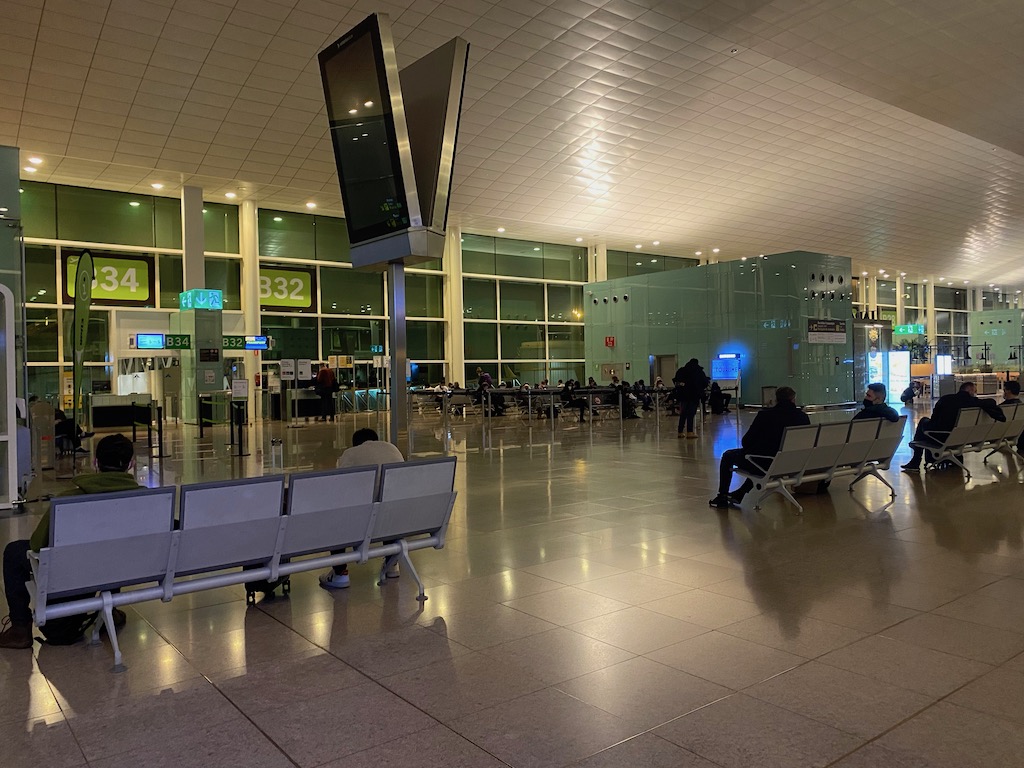
After a full four days in the Catalonian capital, it was time to return home on yet another 6 am flight and 3:30 am wake-up call. The agent at the check-in counter asked to see my negative test before checking my bag and continuing to security. My flight to Frankfurt was half full, and there was no one sitting between me and my row-mate.
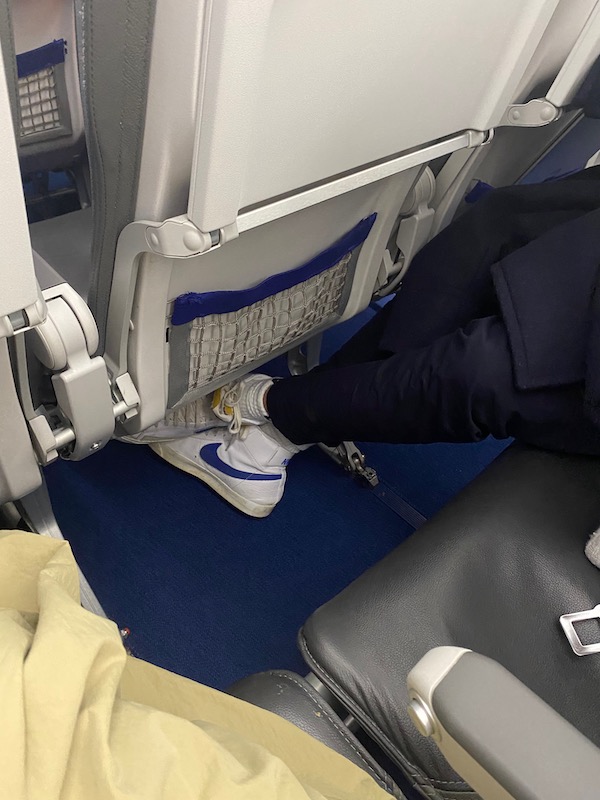
Once we disembarked the plane in Frankfurt, German police greeted us to check that passengers staying in Germany had the correct documentation. Since I was on my way to Split, they sent me along.
With a few hours to spare before my flight to Zagreb, I felt a sense of relief as I was halfway home. I went to the gate only to find passengers boarding to Seattle before us - I don't think there were more than 20 passengers on that plane.

Boarding for Zagreb was slower than normal as the buses that transported passengers from the gate to the plane arrived 20 minutes apart. There was not a free seat on the always-fun propellor plane journey to Zagreb. We were asked to fill out health forms during the flight, which the flight attendants collected and turned into the authorities once we arrived.
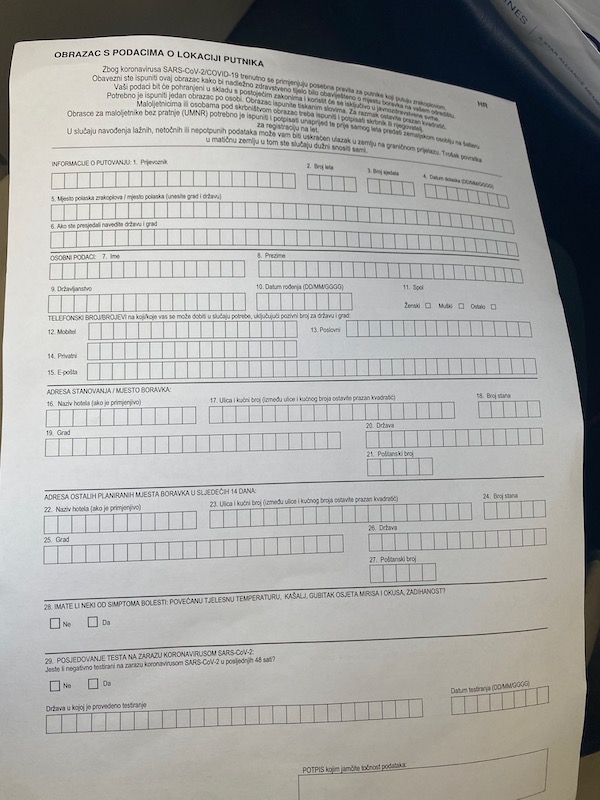
Despite leaving 10 minutes later than scheduled, we arrived in Zagreb on time, or at 1:35 pm, with just enough time for my flight to Split, departing at 2:35 pm. While this would almost always be more than enough time to connect for a domestic transfer at Zagreb Airport, especially during pandemic times, Zagreb managed the unthinkable.
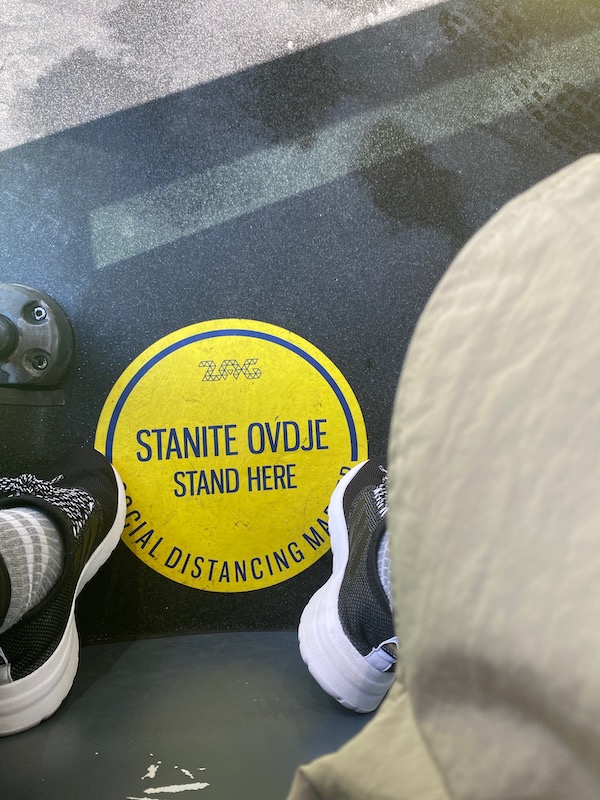
Around 25 people from my Frankfurt flight continued onto a domestic transfer, which resulted in a larger line at passport control - but only in extraordinary circumstances could this affect me making my flight, I thought.
However, only one passport control officer was on duty, spending on average 3-5 minutes with each passenger who:
1.) Didn't know they needed a negative PCR test to enter Croatia and tried avoiding mandatory self-isolation for various reasons, which resulted in phone calls, and even the arrival of a new officer, who didn't think to jump in and help check tests or documents
3.) Had the wrong type of test and complained that they didn't know they needed a PCR test to enter Croatia
4.) Had a negative PCR test to enter, which the officer required you send to his email right then and there.
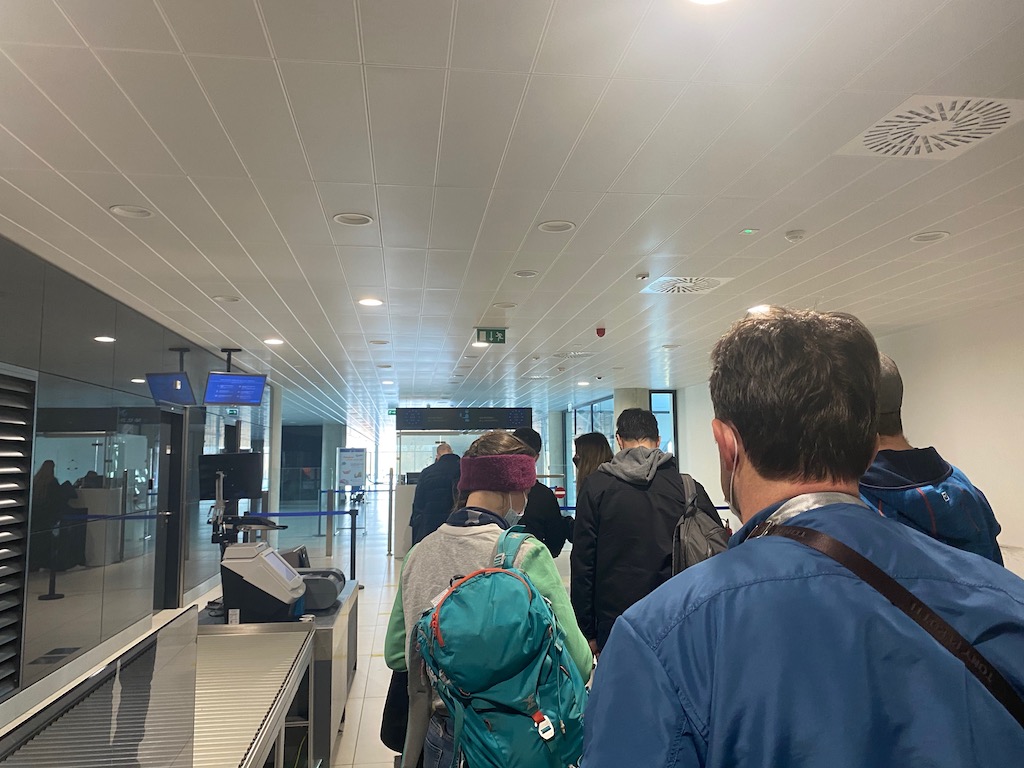
Boarding for my flight was at 2:15 pm, and around 2:00 pm, with another 15 or so still in front of me, I began to worry. Unsurprisingly, there was no one there to speak to apart from the lone worker at passport control.
At 14:18, they called final boarding for Split. I panicked, as did the 7 or so passengers behind me who were also connecting to Split. I asked the man in front of me who was traveling to Dubrovnik if I could sneak in front. I approached the counter and informed the officer they called final boarding for Split and had all of my documents and test ready to go.
He could not have cared less - nor did he hurry in the least.
He looked at my test, told me to send him an email of it, took my phone to enter the email address, and asked for my phone number. After 3 minutes, it was over, I rushed to my gate and informed them there were still others waiting at passport control, unsure of how long it would take. I finally boarded the plane, though the remaining passengers took another 15 minutes to arrive. All because of one officer at passport control.
We arrived in Split safe, sound, and somehow on time, with our bags arriving shortly after.
It was smooth sailing, that is until we arrived back in Croatia. While PCR tests no later than 48 hours old are required to avoid going into self-isolation, Zagreb Airport may want to consider adding a second officer in the passport area when flights land - or you may want to re-think the timing of your domestic transfer.
For the latest travel info, bookmark our main travel info article, which is updated daily.
Read the Croatian Travel Update in your language - now available in 24 languages.


